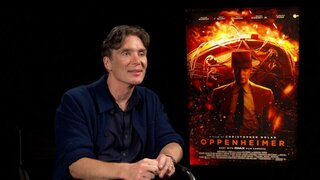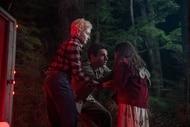Christopher Nolan: AI Innovators Are in the Middle of Their Own “Oppenheimer Moment”
Nolan draws a line between the invention of the atomic bomb and artificial intelligence.
While Christopher Nolan's latest blockbuster — Oppenheimer (hitting theaters everywhere tomorrow) — is solely centered around the Manhattan Project's race to build the first atomic bomb during World War II, the writer/director/producer doesn't see the project as a self-contained experience that viewers can comfortably hold at arm's length. Rather, he views it as an important and timeless parable for why scientists of any age need to take responsibility for their breakthroughs, particularly those that reshape the way we look at the world.
Taking part in a post-screening panel discussion attended by SYFY WIRE and NBC Insider this past weekend, Nolan drew parallels between America's atomic program and the growing presence of artificial intelligence that currently divides Hollywood (the topic of AI is, of course, one of the major sticking points in the WGA and SAG-AFTRA strikes).
Christopher Nolan on AI's "Oppenheimer Moment"
"When I talk to the leading researchers in the field of AI, they literally refer to this right now as their 'Oppenheimer Moment,'" the filmmaker explained. "They’re looking to his story to say, ‘Okay, what are the responsibilities for scientists developing new technologies that may have unintended consequences?’"
RELATED: Barbenheimer: Oppenheimer & Barbie Tracking for Explosive Box Office Weekend
When moderator Chuck Todd (host of NBC's Meet the Press) asked if the movers and shakers in Silicon Valley truly understand the implications of AI, Nolan replied: "They say that they do and that’s helpful. That's at least it’s in the conversation."
Nolan continued: "I hope that thought process will continue. I’m not saying Oppenheimer’s story offers any easy answers to those questions, but it at least can serve as a cautionary tale. It at least can show where some of those responsibilities lie and have people take a breath and think, ‘Okay, what is the accountability?’"
His biggest concern revolves around AI's infiltration of the "defense infrastructure" and how machines may one day be put in charge of nuclear stockpiles. "If we allow people to say that that’s a separate entity from the person who’s wielding, programming, [and] putting that AI into use, then we’re doomed ... We have to hold people accountable for what they do with the tools that they have," he added.
Kai Bird, co-author of American Prometheus (the 700-page and Pulitzer Prize-winning biography upon which the film is based) admitted during the panel discussion that he hopes Oppenheimer will "jumpstart a conversation about the role of scientists and the need for us — as a society drenched in technology and science — to have scientists as public intellectuals to advise us."
RELATED: Could Oppenheimer’s Atomic Bomb Really Have Destroyed the World?
But not all AI poses a threat to Nolan, who sees machine learning as a useful tool in the realm of filmmaking, albeit not one meant to replace human artists. "I think AI is already a very powerful tool in our business as far as visual effects go," he said.
Oppenheimer detonates on the big screen tomorrow, July 21. Click here to pick up tickets! Rocking a 94% score on Rotten Tomatoes (the highest rating in Nolan's body of work alongside The Dark Knight), the film is being hailed by critics as the best movie of the year.
Want more blockbuster thrills in the meantime? Jaws, Jurassic Park, The Da Vinci Code, The Hunger Games, Fast Five, Jurassic World, Knock at the Cabin, Cocaine Bear, Renfield, and more are now streaming on Peacock!













































